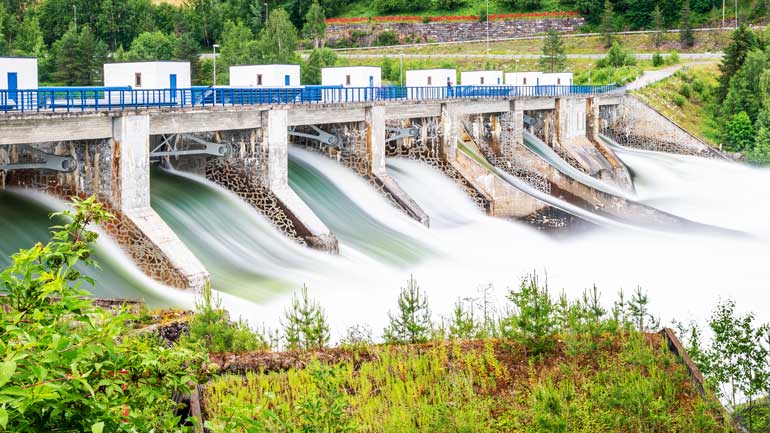Electrical Power Engineering
Porsgrunn - Full time
Do you want to contribute to the green transition by developing the power systems of the future? Become an expert in electrical power engineering.
-
Closing dates: Expired
Study facts
-
Campus: Porsgrunn -
Study level: Master's degree -
Progression of study: Full time -
Start up: Autumn 2024 -
Teaching model: On Campus -
Credits: 120 -
Closing dates: Expired -
Application code: Non-EU 7149 and EU/EEA 7140 -
Semesters: 4 -
Teaching Language: English

Sivilingeniør
This master program entitles you to use the protected title “Sivilingeniør”»
Why study Electrical Power Engineering?
Our society is going through a green transition from fossil fuels to more sustainable energy systems. The growing demand for electrical energy requires increased power production and grid upgrades. In addition, the transition raises new challenges to maintain reliability and safety of the power system. Thus, more specialists in electrical power engineering are needed to plan and implement new, smart (digital) solutions.
The master program at USN is closely connected to local industry, and national and international power companies. These contribute to teaching and provides student projects. With a master’s degree in Electrical Power Engineering, you will be an attractive candidate in a growing job market.
You can choose a traditional campus study program, or you can apply for the industrial master program, where you work 50 % in a relevant company while you study.
Semester exchange to USN
Within this programme there are several exchange opportunities for students from partner universities. Please contact our programme coordinator for details and course lists. Application deadline is April 15 for autumn semester and October 15 for spring semester for exchange.
Where can I work?
With master’s degree in Electrical Power Engineering , you are qualified for jobs in planning and developing the power system of the future.
You can work with electric power production, transmission, distribution (power grid), or with the components applied in power systems.
Graduates now have jobs at:
- Power production companies (e.g., Skagerak Kraft, Havslund Eco, Vesterårskraft).
- Grid operators (e.g., Lede, Linja)
- Industry companies manufacturing power system components (e.g., ABB, Hitachi, Siemens, Schneider)
- The public sector (e.g., Bane NOR)
- Consultancies (e.g., Norconsult, COWI, Multiconsult, Bilfinger, Sweco)
- Industrial companies (e.g., Aibel, Kongsberg Gruppen, Aker Solutions)
Working with the local business community
The local business community will be involved throughout this programme, from guest speakers from our partnering institutions to visiting with relevant companies in the community.
What you will learn
The master’s program offers a solid background for planning, modeling, and operating power systems.
Examples of learning outcomes:
- Simulation skills necessary to analyze and optimize power systems.
- Operation of the power system for stable and reliable power supply (including monitoring, stability, protection, and frequency control).
- Modeling and control of dynamic hydro power systems.
- Introduction to offshore wind power.
- Design of power electronic components and their applications.
- Testing of power system components in the high-voltage and high-current laboratories at the Porsgrunn campus.
We also offer electives on machine learning, cyber security, software engineering, and advanced control systems.
Further studies
Would you like to continue your studies? With a master ’s degree in Electrical Power Engineering, you may also be qualified for PhD-studies in Norway and abroad.
Get international experience
You can take parts of Electrical Power Engineering abroad. Studying or taking an internship abroad can give you the opportunity to expand your international competence, language skills, personal qualities and adaptability. It can also make you more attractive in the job market. We have agreements with foreign universities, colleges and internships adapted to your studies.
Study Plan
A study plan describes the content, structure and organization of a study programme. To each study plan there is a set of course plans that describe the different courses. In the course plan you will also find a reading list. Below you will find a study model that shows you which courses that are taught in each term. In the study model you'll also find links to each course plan.
Study plan for 2024 autumn
Admission requirements
This programme requires a completed and passed Bachelor's degree in engineering in line with the National Curriculum Regulations for Engineering Education in Norway in electrical power engineering. Related programmes (such as electrical engineering, mechatronics or renewable energy) may also be accepted provided that the applicant can demonstrate at least 10 ECTS in electrical machines/power systems or equivalent.
For all applicants, the following is also required:
- At least 25 ECTS in Mathematics
- At least 5 ECTS in Statistics
- At least 7,5 ECTS in Physics
- Have a minimum grade average comparable to a Norwegian C
- You must also fulfil the English requirements
Please read all the information about the admission process before you apply.
Export control
This programme may be covered by the regulations on export control. Export controls are applied to countries where there is suspicion about development and use of weapons of mass destruction. USN may therefore decide to conduct a specific evaluation of these applicants. As it is under discussion, we do not have more information at present.


